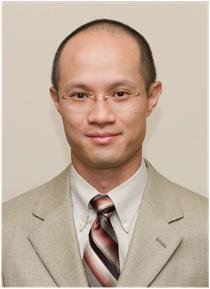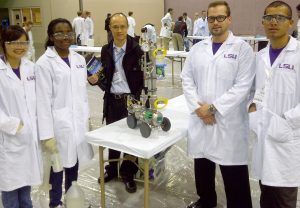Francisco Hung Receives NSF Career Award
– May 13, 2013
The GoMRI community congratulates one of our own – Dr. Francisco Hung, Assistant Professor of Chemical Engineering at Louisiana State University – as a recipient of the prestigious NSF Career Award.
The NSF Faculty Early Career Development (CAREER) Program offers this five year, $400,000 award to support junior faculty of exceptional promise and who exemplify the role of teacher-scholars through outstanding research, excellent education, and the integration of education and research.
Dr. Hung is an investigator with the GoMRI-funded Consortium for the Molecular Engineering of Dispersant Systems (C-MEDS), led by Dr. Vijay John at Tulane University.
The focus of Hung’s research is on computer simulations at the molecular level; this NSF CAREER Award in particular concentrates on studying ionic liquids, which can have very diverse applications, for example recovering oil from sand. Dr. Hung explains that molecular simulations can complement laboratory experiments in a unique way, “Computer simulations can help you have a deeper level of understanding of experiment results. A simulation at the molecular level of detail allows you to see what the molecules are doing, and can provide explanations to experiments that might be puzzling.”
The education components are key criteria for this award. Dr. Hung incorporates his research into the courses he teaches, has undergraduate and graduate students work with him on his projects, and mentors summer interns with different Research Experience for Undergraduates (REU) programs in which he is involved. Hung plans to design hands-on activities for public-school students in grades 8-12, then have undergraduate students go into public schools and engage the students there, saying, “These activities aim to help kids see that science and engineering are fun and exciting, not boring and out of their reach.” Dr. Hung mainly wants the undergraduates to be the primary ones interacting with these students, adding, “It’s more effective for a person closer in age and who is a student to talk and work with young kids; it’s better than having a professor telling them things.”
Dr. Hung’s Venezuelan heritage drew him to become an advisor to the LSU chapter of the Society of Hispanic Professional Engineers. “I try to encourage them to excel in engineering. I tell them that I came to this country without too much money and my mom and brothers are far away. And yet I am here, and it is possible to succeed in science and engineering and help them see that this is an exciting and good career.”
The news of this award could not have come at a better time. Dr. Hung had heard that awardees typically receive a phone call from the program manager, and as the time for expected announcements dwindled, his hopes likewise sank. A friend he has not seen for over 10 years was visiting Francisco and his family, and while they were walking around nearby New Orleans, Francisco decided to check his phone for email, “And there it was – a message that I got the award. It was so unexpected! We were jumping for joy right in the middle of a store!”
“It is a great, humbling honor,” said Dr. Hung in response to LSU Dean of Engineering Rick Koubek’s description of this award as recognizing “the very top rising research stars in the country.” The award process includes peer-review of every proposal. “Knowing that some of my peers think highly about my work makes me feel very happy.”
The GoMRI research program is a 10-year, $500 million independent research program established by an agreement between BP and the Gulf of Mexico Alliance to study the effects of the Deepwater Horizon incident and the potential associated impact of this and similar incidents on the environment and public health.
© Copyright 2010- 2017 Gulf of Mexico Research Initiative (GoMRI) – All Rights Reserved. Redistribution is encouraged with acknowledgement to the Gulf of Mexico Research Initiative (GoMRI). Please credit images and/or videos as done in each article. Questions? Contact web-content editor Nilde “Maggie” Dannreuther, Northern Gulf Institute, Mississippi State University (maggied@ngi.msstate.edu).







